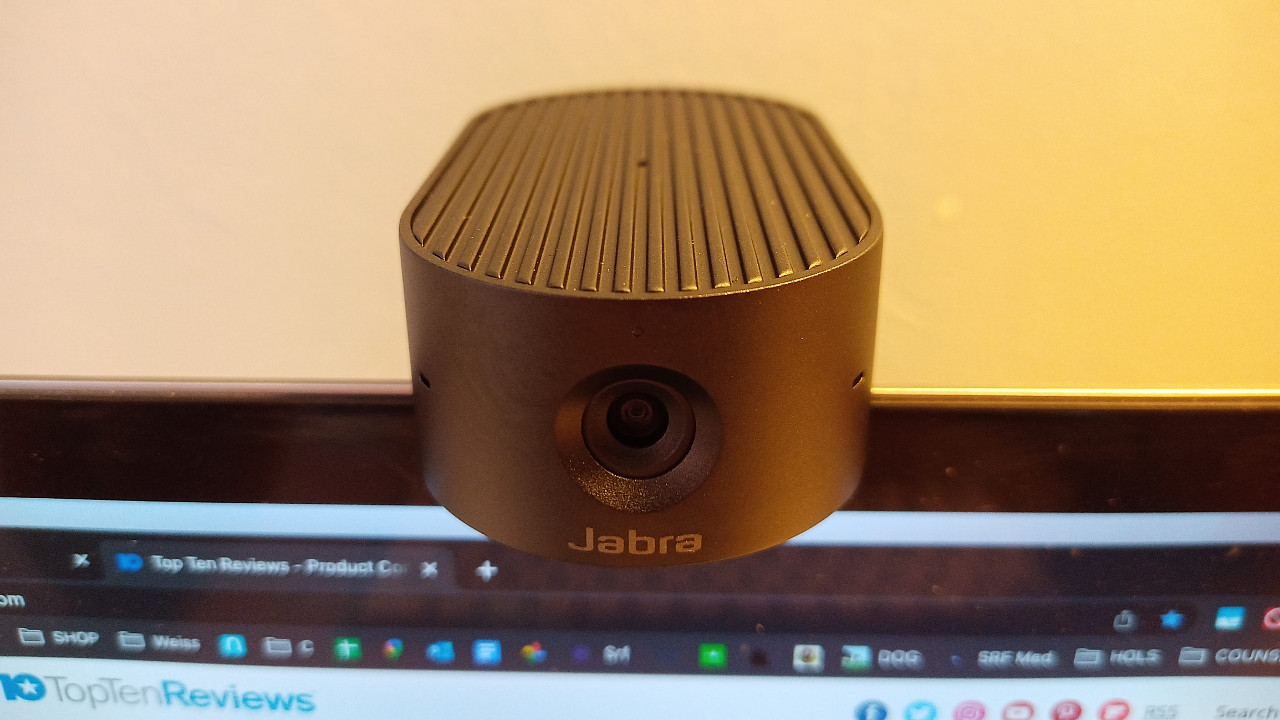Top Ten Reviews Verdict
The PanaCast 20 is a solid first home webcam from Jabra which offers a premium portable build, useful features and super ease of use.However, that all comes at quite a high price.
Pros
- +
Easy to setup and use
- +
Premium build quality
- +
Intelligent zoom with 4K res
- +
Integrated privacy cover
- +
Travel friendly with case
Cons
- -
Expensive
Why you can trust Top Ten Reviews
The Jabra PanaCast 20 is a webcam that aims to upgrade your standard setup to make video calling a more professional experience. As the first home webcam from Jabra, this follows in the footsteps of the professional conference PanaCast and PanaCast 50, at a more affordable price. That said, this is still not a cheap option, but you do get some impressive features and a pro-level premium build quality for your money.
Video resolution: 4K
Image resolution: 13MP
Microphone: Triple
Connection type: USB-C
Mounting options: Built-in clip-on, plus screw hole for tripod
All of that has landed the Jabra PanaCast 20 into our list of the very best webcams out there right now. Following the lockdown-based rush to working from home, there are now more options than ever before. As such, you can get more affordable models that offer a similar quality of video and audio. However, this model does have some special features, all of which are laid out in this review to help you decide whether this is the webcam for you.
Jabra PanaCast 20: Design
Right from opening the box, it's clear that this is a premium quality product, with minimal packaging and a strong zip-lock carry case holding everything you need. That means a long coiled-up USB-C cable and the neat PanaCast 20 itself.
Slide the camera out and it feels compact in the hand at 3.1 x 1.8 x 1 inches, yet it's reassuringly weighty with a strong metallic build. It all screams of portability, including the mount, which is built-in.
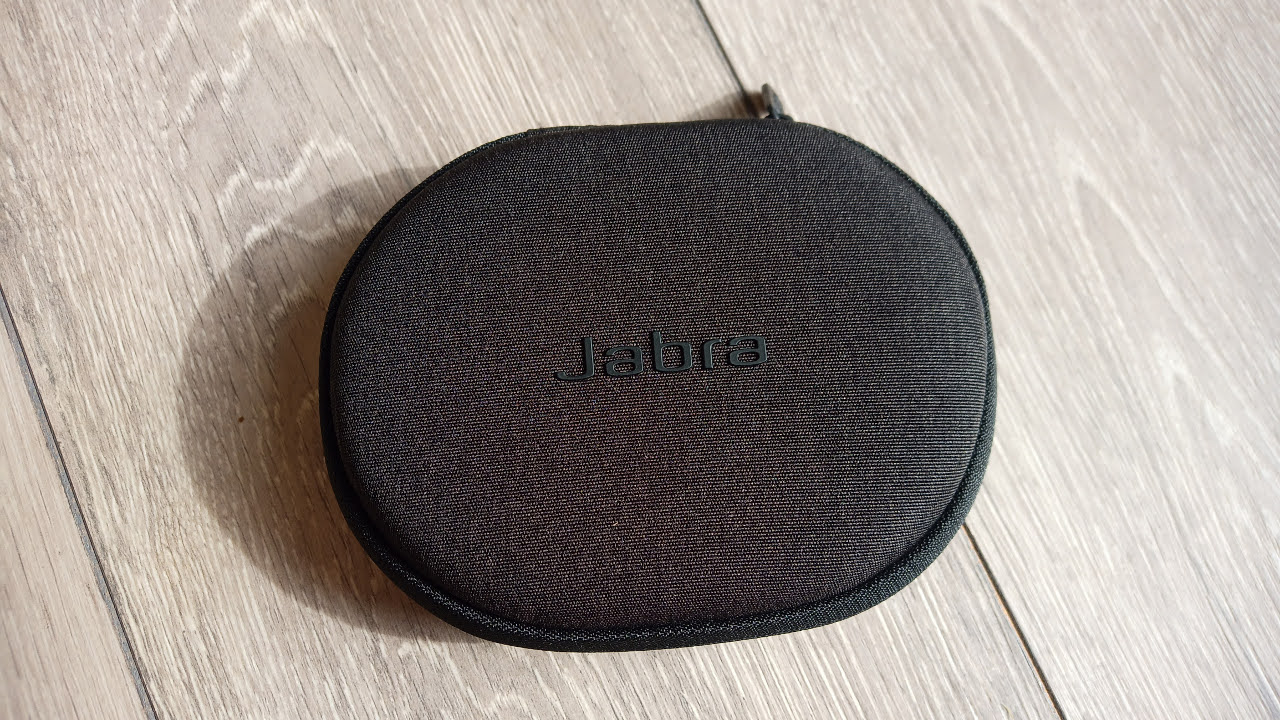
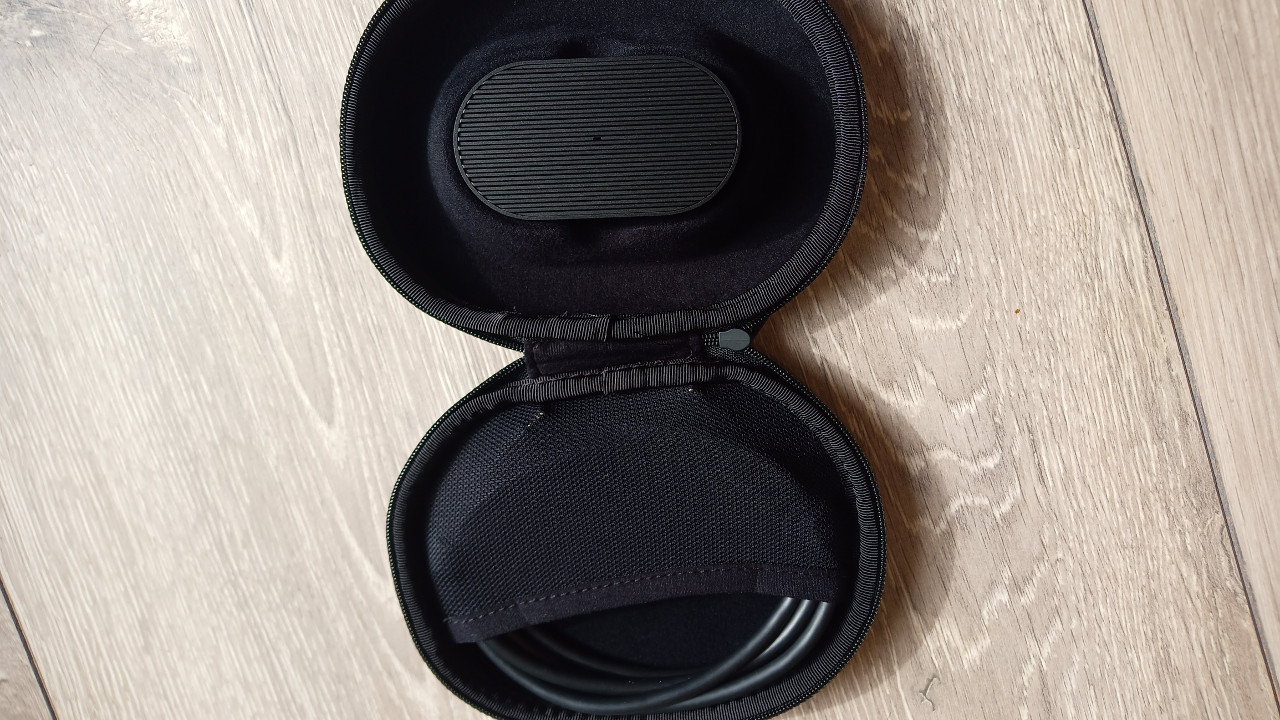

Flip the camera over and there is a USB-C port on the bottom for connectivity. This sits next to the pop-out mount which is rubberized so it grips the top of laptops and monitors of varying thicknesses. This flips back to up to 90-degrees and can accommodate most monitors but it does feel like it could go further back to help better attach to thicker monitors more solidly. There is also a standard quarter-inch screw hole so you can attach this to any tripod or mount if you prefer.
Inside is a 13MP, 1/3.2-inch sensor with a 117-degree, f/2.25 lens which is capable of 4K resolution video. This is backed by three MEMS microphones for audio pick-up.
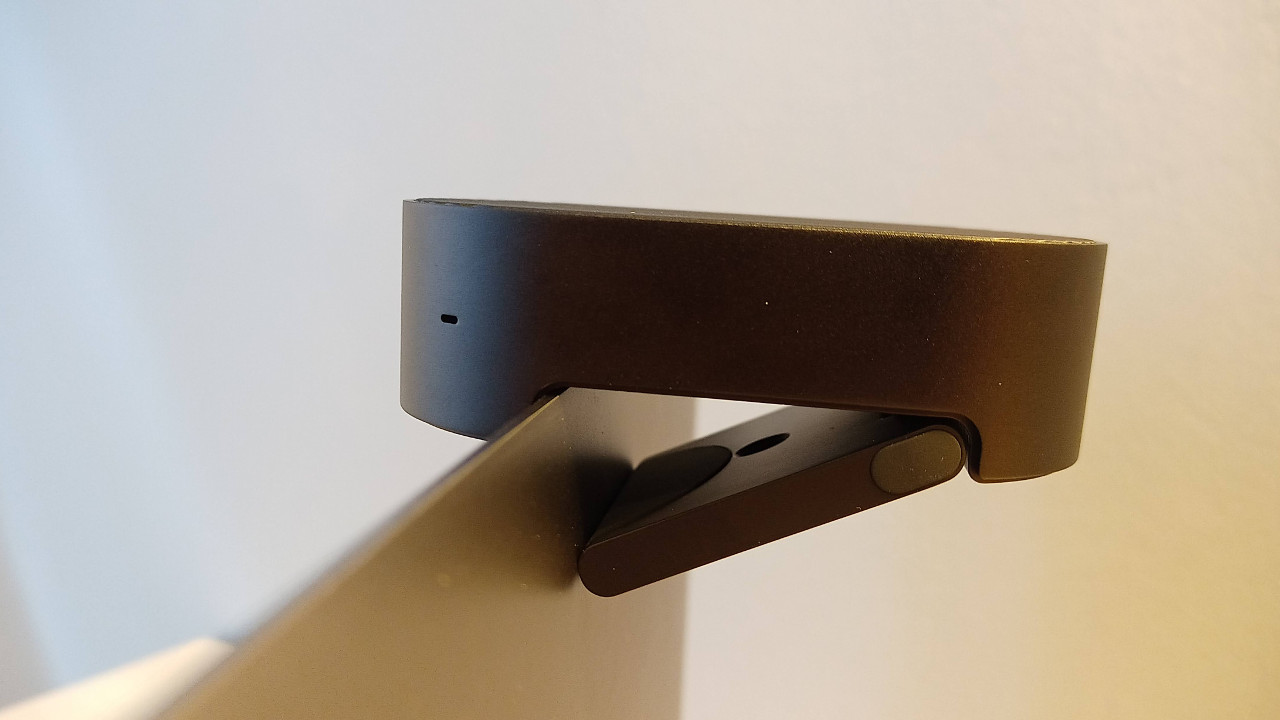
On the underside of the front is a grippy slider that can be used to manually open and close the privacy cover on the lens. You can also see the small drill holes on the top and to the sides of the lens where the triple microphones sit.
Sign up to receive the latest news, reviews, buying guides and deals direct to your inbox
The zip-case is solid with a shell-like soft-cover outer. Inside it is molded to hold the camera in place within a soft anti-scratch material. There is also a net section to easily hold the USB-C cable, making transport super simple.
Jabra PanaCast 20: Set up and usability
Getting setup is super simple since this is clearly a plug-and-play device. That means going from desktop to laptop as you move between office and home should be easy – in fact, it's what this was designed for.
The Jabra PanaCast 20 comes with software for both Mac and Windows which can help to access more advanced features like intelligent zoom and picture in picture, but more on them later. What's not so easy is finding the link to the software. There isn't a direct one in the packaging, just a link to manuals, then within that, you have to read through a good few pages before finding the link to download the software, which can't be clicked but has to be typed in. It just all feels a bit too hidden where most products now have a QR code on the packaging to get you started.
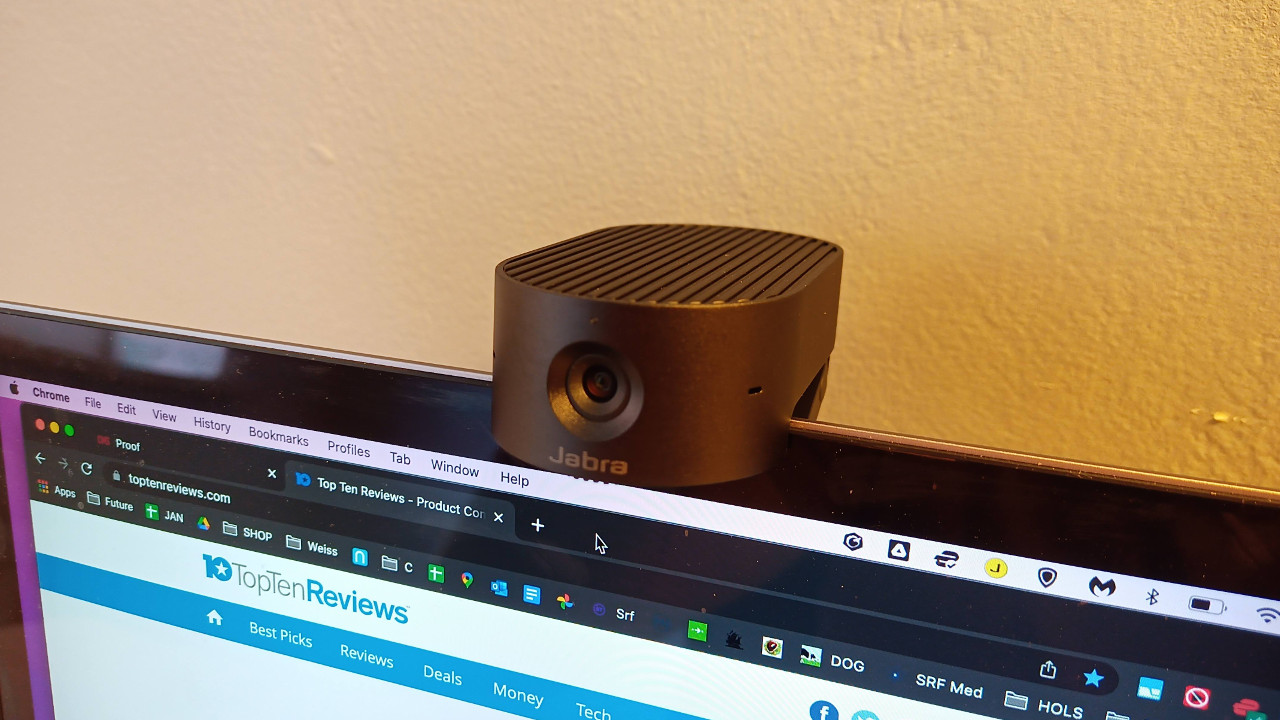
Clipping the webcam onto a laptop or monitor is super easy, then you just plug in the USB-C cable and you can get going right away. This lets you go straight into the Jabra software to play with settings. You can also open your video conferencing app of choice and the option to select the PanaCast 20, for video and audio, will be right there.
The slide privacy cover is easy to use, which may not have been the case with that grip mount. But since Jabra has balanced everything so perfectly, even pushing that across with clumsy fingers still opens and closes the premium feeling lens cover without the camera moving from its position.
Jabra PanaCast 20: Performance
Camera quality is often the big deciding factor in buying a webcam and the PanaCast 20 packs in a 4K resolution video and 13MP image sensor, as well as triple microphones – so expectations were high. And since everything in this webcam is automated, it's very easy to use and gets the top result without the user having to adjust anything.
But why have 4K resolution when most monitors don't offer this and video calls over the internet try to keep resolution down for smoothness? Cropping in is the answer. This function allows you to zoom in on an area of the screen and crop in. With up to three times zoom still offering 720p quality, this is a very freeing option and works well for group calls, zooming in to the face of the person talking automatically, for example.
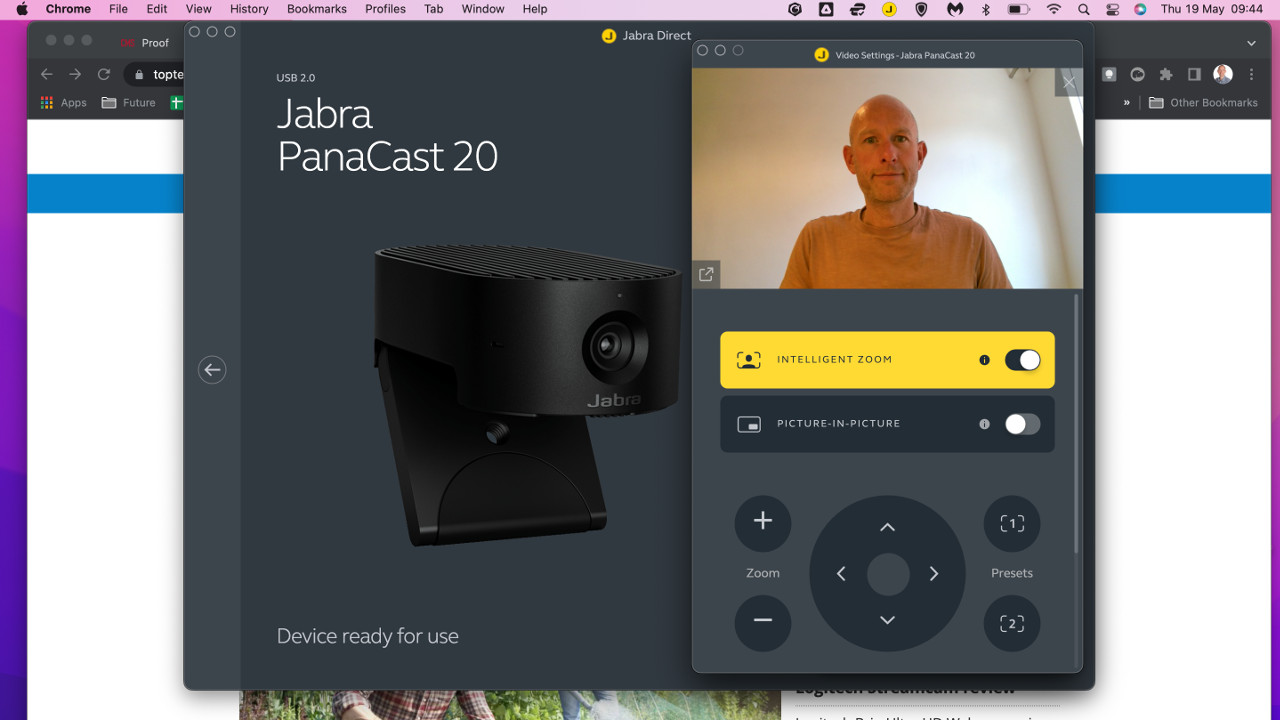
What's also useful about this zoom is the ability to work intelligently with picture-in-picture. Essentially, this allows you to hold something up to the camera and still have your face clearly shown in a small window in the corner. So you could be holding up a document to screen, that the other person sees clearly, all the while still talking and them seeing your face as you describe what you're saying.
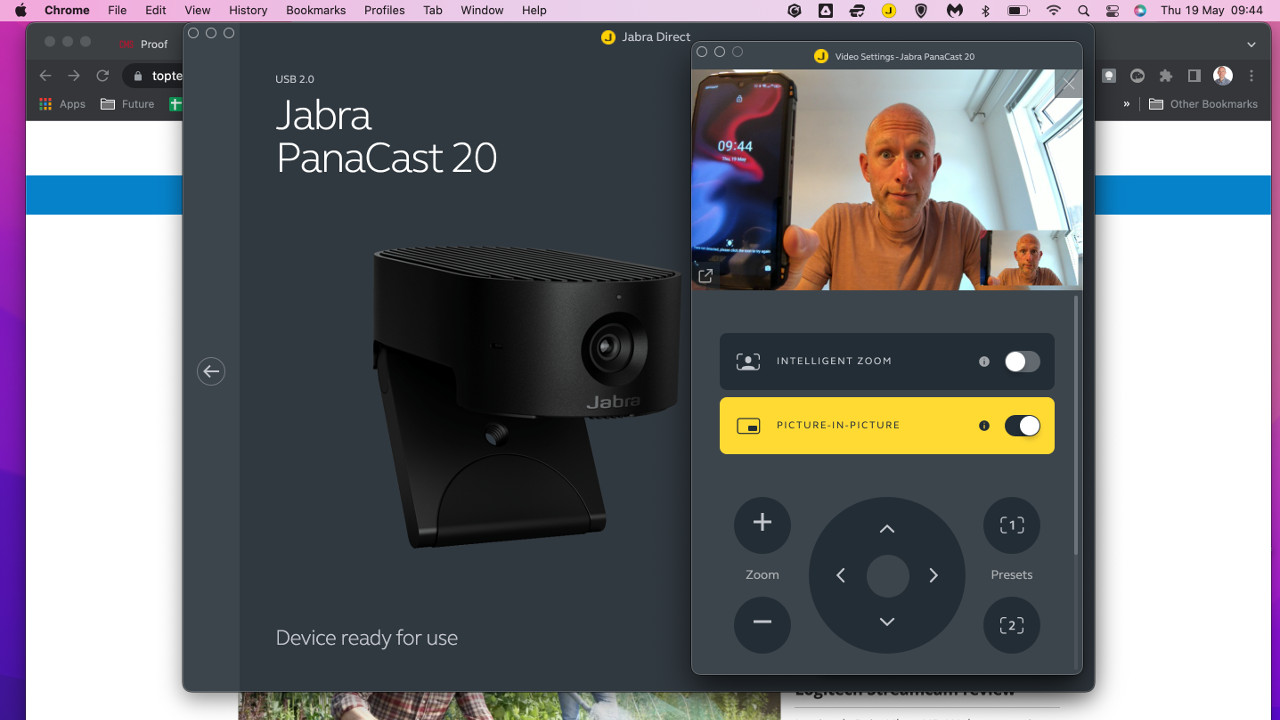
The Jabra PanaCast 20 yields a decent quality image and well-balanced sound. Compared with a 720p built-in Mac webcam, the quality is noticeably different with more brightness, greater range and enhanced contrast, as well as being sharper.
Once in a darker room, using monitor light only, the quality was less clear with obviously fuzzy parts. It's still better than a lot of cameras but not as good as some top-end options and may mean it's worth thinking about investing in lighting too if you plan to do calls in a dark environment.
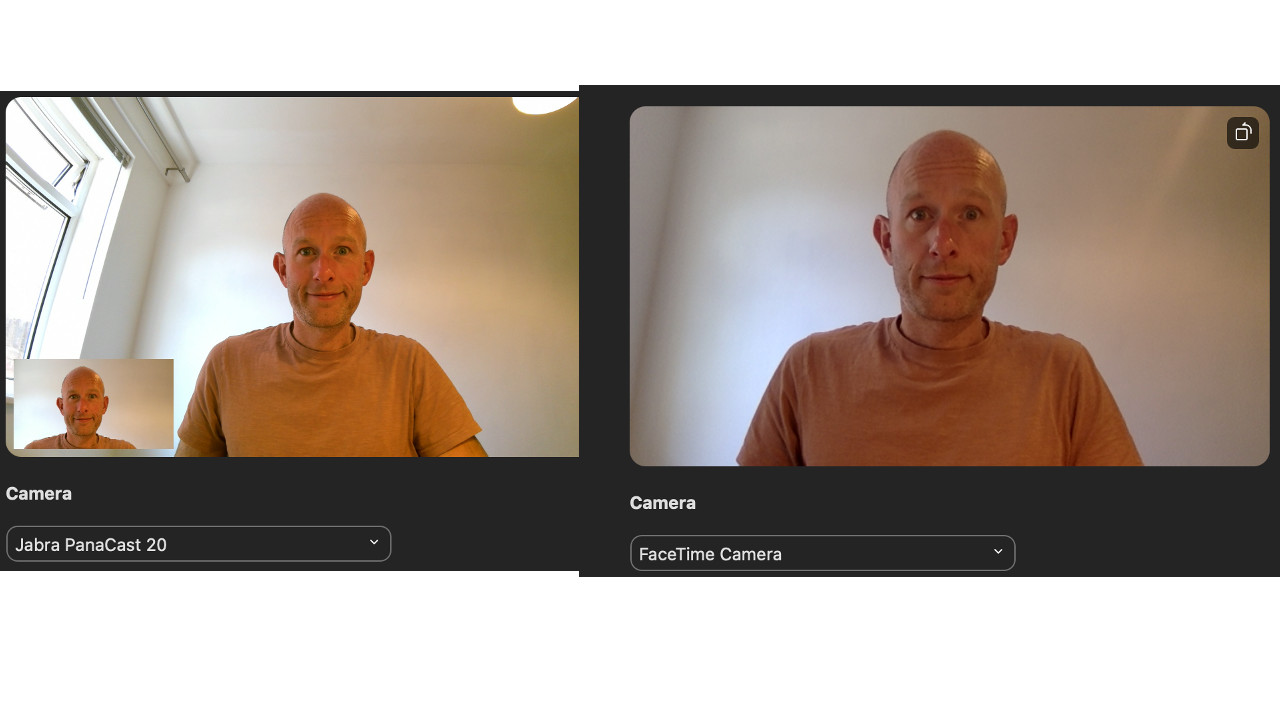
As you can see, the field of view on the PanaCast 20 is also far better in terms of width, giving a more spacious feel to the video.
The audio was great in larger rooms with multiple people, making this a useful team conferencing tool. In a smaller room, with a single voice, it was less clear than perhaps it could have been. This is clearly tuned for business, like its predecessor models, and perhaps could do with a little more focus for individuals. That said, this is picking holes and the performance will be more than enough for most as it is far better than most computers offer natively.
Jabra PanaCast 20: Price and warranty
- $329 / £306
The Jabra PanaCast 20 price is not low. This is definitely at the premium end of the market putting it up against other 4K models. However, you can get very good performance from lower-priced cameras.
The Razer Kiyo Pro, for example, is priced at $199.99 and offers as good performance.
Jabra does sell the PanaCast 20 with an impressive two-year warranty. This is reassuring especially if you plan to travel about a lot with this, which could incur some wear and tear.
Jabra PanaCast 20: User reviews
Users of the Jabra PanaCast 20 have given overwhelmingly positive feedback. Head over to Amazon and you'll find a 4.5 out of 5-star average rating.
One positive comment said: "The build quality of the PanaCast 20 is a cut above almost every other webcam on the market."
However, some users commented on sound quality, with a negative comment reading: "I can't record audio while using this camera at all without getting some type of crackling or interference."
Should you buy the Jabra PanaCast 20?
If you want a webcam that offers a high 4K resolution and triple array microphones for larger rooms, groups or conference calls – and need it to be portable – this is the model for you.
However, while camera quality and audio is decent, you can get the same for a lower price. So you just need to decide if you're prepared to pay a little more for a super-premium quality build and that freedom to be portable.
If this product isn’t for you
The Logitech C922 Pro Stream is a professional quality 1080p webcam that manages to keep the price low. With some fantastic auto light and focus correction features, this is effortless to use yet offers a very high-quality end result. The dual microphones take this further for very clear vocal audio and everything is contained in a lightweight, easy to mount yet premium quality build.
For streamers, the Elgato Facecam is a camera built to task with a superb Sony sensor that gives the 1080p and 60fps video a fantastic quality. There is a lack of microphone and this won't autofocus, but then for streamers with a fixed setup and dedicated mic that's ideal – all the money is going on the video quality instead of those extras. For YouTube and Twitch streamers, this is the webcam for you.
The Razer Kiyo Pro is a more expensive webcam but it justifies the price with a super smooth quality 1080p and 60fps video result. Thanks to auto adjustments for lighting – even in low light – and HDR functionality, the quality is super-premium. It's also built to work well across the software from video calling to live streaming on Twitch.
Luke is a veteran tech journalist with decades of experience covering everything from TVs, power tools, science and health tech to VPNs, space, gaming and cars. You may recognize him from appearances on plenty of news channels or have read his words which have been published in most tech titles over the years. In his spare time (of which he has little as a father of two) Luke likes yoga, surfing, meditation, DIY and consuming all the books, comics and movies he can find.
